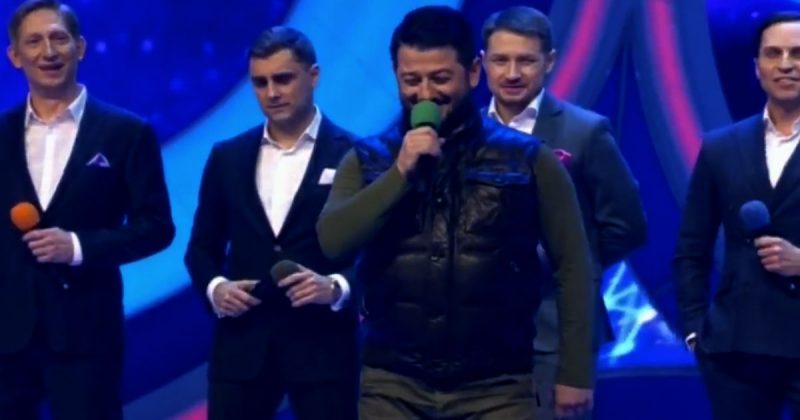Chechen dictator Ramzan Kadyrov, whose regime is widely accused of human rights crimes, is a comedy star on Russian television this week. Or rather, comedian Mikhail Galustyan’s impression of Kadyrov has surprised and entertained the millions who tuned in this weekend to watch the 55th anniversary of Russia’s “KVN” comedy club.
Political parody is a perilous thing in Russia, where the last unbridled satire to grace the small screen is widely considered to be the TV show “Kukly” (Puppets), which was taken off the air more than 14 years ago, when the Kremlin allegedly lost its patience for being mocked so openly.
Kukly is often likened to “The Daily Show” in the United States — a comparison that captures the fact that both shows lampoon public figures, but fails to prepare you for the garish puppets that starred in Kukly, and the stilted, unsubtle sketch comedy the show’s writers used to ridicule Boris Yeltsin and later Vladimir Putin.
Years after Kukly bit the dust, Russian political parody seemed to be making a feeble comeback. In the early 2010s, before Dmitry Medvedev announced that he would step down from the presidency to allow Vladimir Putin to return, the atmosphere felt like it might be changing, Ellen Barry wrote at the time. To the surprise of many, the state-funded national TV network Channel One aired a special musical segment lampooning President Medvedev and Prime Minister Putin on New Year’s Day in 2010.
The parody was light-hearted, to say the least. Little cartoon versions of Medvedev and Putin danced in Red Square, playing instruments and shaking their butts, while singing playful barbs aimed at Kremlin adversaries, like the White House, the Viktor Yushchenko presidency in Ukraine, and others. The duo even returned the following year for an encore performance, having established itself as a regular, if somewhat dull, presence on a Russian television show that practiced similarly “safe” humor ridiculing Moscow’s geopolitical foes.
The cartoon show that gave us the dancing, singing Kremlin tandem, along with another popular television program called “Prozhektorperiskhilton,” which was also built on joking about current events, didn’t last beyond 2013 — the year after Putin’s return as commander in chief.
Throughout Putin’s third term as president, Russia has witnessed incredible transformations domestically and abroad. The relative thaw under Medvedev gave way to a political crackdown at home, and Moscow’s new willingness to sustain military interventions beyond its borders has changed the way many look at the world map.
With Russia’s September parliamentary elections over and done, the country’s political talk now turns to 2018, when Vladimir Putin is expected to run for a fourth term in office, paving the way to another six years in power — extending his lease on the presidency to 2024, when Putin will turn 72.
Facing the prospect of a 25-year reign by one, increasingly reactionary politician, Russians were understandably surprised this weekend to see comedian Mikhail Galustyan on television impersonating Ramzan Kadyrov, the brutal dictator of Chechnya. Dressed like Kadyrov, mumbling in a Chechen accent, and strutting about on stage, Galustyan did a remarkably good job pretending to be the ruler of Chechnya.
And, by the way, President Vladimir Putin was in the audience, laughing politely.
“Я сразу говорил, что победит Трамп”: Путин и “Кадыров” на юбилее КВН pic.twitter.com/y0NNO9U1Uv
— Дмитрий Смирнов (@dimsmirnov175) November 27, 2016
“I said straight off that Trump would win.” Putin and “Kadyrov” at KVN's anniversary celebration. ~Dmitry Smirnov
Like the parodies that have appeared on Russian television since the Kremlin purged the medium of genuine satire in the early 2000s, Galustyan’s impression was largely anodyne.
The edgiest moment in the performance was probably when Galustyan’s Kadyrov, in an uncouth gesture, wiped his hand on his pant leg, before extending a greeting to the show’s host. The joke was likely meant to be that Kadyrov is a relatively unrefined man, whose hands are liable to be dirty from work at any moment. Interpreted another way, however, the bit could have hinted that Kadyrov’s hands are dirty in a more symbolic sense. (Columnist Oleg Kashin seemed to relish this possibility, at least.)
The story didn’t end with the TV broadcast, however. A day after Galustyan’s parody aired, Ramzan Kadyrov himself claimed on social media that he’d helped the comedian prepare the schtick, apparently rehearsing it with him twice, and providing Galustyan with the very clothes he wore on stage. “Everything was good with the accent,” Kadyrov explained on Vkontakte. “He’s the master at this. I told him not to make it too hard for viewers to guess who he was parodying!”
After Channel One aired the footage of Galustyan’s Kadyrov impression, some social-media users wrote that they worried for the comedian’s personal safety, implying that Chechnya’s ruler might seek revenge for perceived slights.
Galustyan seems to be fine, however. And Ramzan Kadyrov is happy as a clam.









1 comment